Rachel S. Cordasco's Blog, page 3
June 9, 2025
Review: The Proposal by Bae Myung-Hoon
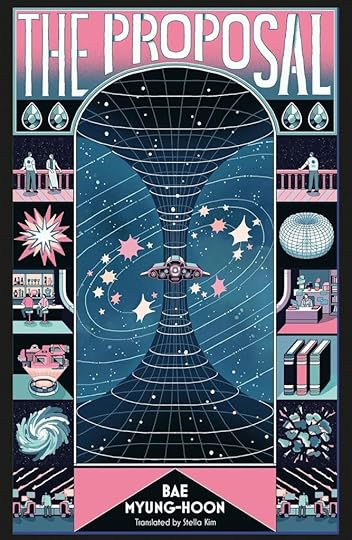
translated by Stella Kim
original publication (in Korean): 2013
first English edition: 2024, Honford Star
144 pages
grab a copy here or through your local independent bookstore or library
The Proposal is Bae Myung-hoon’s third book in English (all published by Honford Star). I reviewed his second, Launch Something!, here two years ago, and thoroughly enjoyed Bae’s story about ROK Space Force members, political intrigue, and a strange origami satellite. This time, Bae puts us firmly in space, dropping us into the mind of a space-born soldier serving in a fleet that has found itself at war with a mysterious (alien?) race.
Written as a series of letters from this soldier to his girlfriend on Earth, The Proposal explores everything from long-distance relationships and “Earth-born” instincts to space fleet dynamics and political intrigue among the highest ranks in the Allied Orbital Forces. In his early letters, the unnamed soldier lingers over the fascinating differences between Earth-born and space-born people, such as the fact that the former love having a sense of direction:
The most primal ethic that makes humans human is not the taboos against cannibalism or incest but the ability to tell apart up from down, apparently. Something about how a human ear must hear the sound of gravity pulling their body long before they can hear the voice of their ego or conscience (15).
Despite these differences, many Earth-born and space-born couples manage to have relationships, with people visiting each other whenever they have leave. The advent of the war, though, has made it more difficult for the soldier to see his girlfriend, hence all of the letters that he has been writing to her. We learn that, many years ago, a book called Prophecies foretold the war: an alien force would appear and threaten Earth from an interdimensional portal. Unbelievable quantities of money and time were spent to address this prophecy: a massive fleet was built and launched into space, one that would be ready for anything that appeared. Just as humanity was starting to wonder of it made a mistake, a large fleet of seemingly alien ships appeared and started attacking the Earth fleet.
With each encounter, the soldier-narrator realizes more things that are odd about the entire situation. Why does the alien force seem to have the exact same weapons as the human force? How does the alien force know exactly where the human ships are each time? Despite upgrading the ships and their technology after each encounter, the humans find that they’re sitting ducks. The aliens seem to know exactly where the humans will be, and though the Earth force is able to defend itself better each time, it still suffers many casualties.
Even with this alien threat, Earth’s command starts to wonder if there are rebels among the Allied Orbital Forces. An inspection force is sent to the fleet to find out if one of the generals is planning to turn his guns on Earth. General De Nada, realizing that he is under suspicion but still determined to defeat the alien forces, uses the inspection force ships to achieve stunning results.
Particularly fascinating for this reader is the slow, subtle dawning on the soldier-narrator that what the humans are fighting may not be aliens at all…I won’t spoil it for you because I want you to read this short, intense, compelling Korean novel so skillfully translated into English by Stella Kim. It’s well worth your time.
June 4, 2025
Out This Month: June
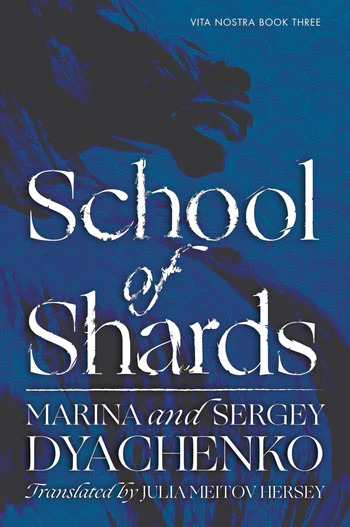 School of Shards by Marina & Sergey Dyachenko, translated from the Russian by Julia Meitov Hersey (Harper Voyager, June 17)
School of Shards by Marina & Sergey Dyachenko, translated from the Russian by Julia Meitov Hersey (Harper Voyager, June 17)The haunting final chapter of the modern classic Vita Nostra trilogy. The Dyachenkos’ magical dark academia novel brings the story of Sasha to a revelatory climax as she learns to take control of her powers and reshape the world…or destroy it forever.

I Gave You Eyes and You Looked Toward Darkness by Irene Solà, translated from the Catalan by Mara Faye Lethem (Graywolf Press, June 17)
Dawn is breaking over the Guilleries, a rugged mountain range in Catalonia frequented by wolf hunters, brigands, deserters, race-car drivers, ghosts, and demons. In a remote farmhouse called Mas Clavell, an impossibly old woman lies on her deathbed. Family and caretakers drift in and out. Meanwhile, all the women who have lived and died in that house are waiting for her to join them. They are preparing to throw her a party. As day turns to night, four hundred years’ worth of stories unspool, and the house reverberates with raucous laughter, pungent feasts, and piercing cries of pleasure and pain. It all begins with Joana, Mas Clavell’s matriarch, who once longed for a husband—“a full man,” perhaps even “an heir with a patch of land and a roof over his head.” She summoned the devil to fulfill her wish and struck a deal: a man in exchange for her soul. But when, on her wedding day, Joana discovered that her husband was missing a toe (eaten by wolves), she exploited a loophole in her agreement, heedless of what consequences might follow.
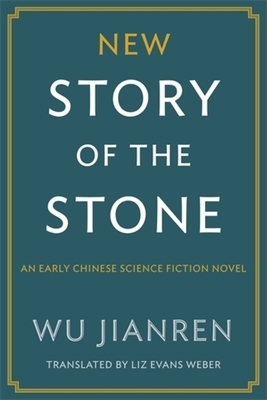 New Story of the Stone: An Early Chinese Science Fiction Novel by Wu Jianren, translated from the Chinese by Liz Evans Weber (Columbia University Press, June 24)
New Story of the Stone: An Early Chinese Science Fiction Novel by Wu Jianren, translated from the Chinese by Liz Evans Weber (Columbia University Press, June 24)One of China’s first works of science fiction, New Story of the Stone is a belated twentieth-century sequel to the beloved eighteenth-century masterpiece Story of the Stone (more famously known as Dream of the Red Chamber). The story follows protagonist Jia Baoyu, borrowed from the original Story, as he is dramatically hurled forward over a hundred years from his own time into a bewildering future: first the decadent semicolonized late Qing China of the author’s own time and later an astonishing high-tech Confucian utopia called the Realm of Civilization.
May 2, 2025
Out This Month: May

Red Sword by Bora Chung, translated from the Korean by Anton Hur (Honford Star, May 13).
Red Sword is the mesmerizing and haunting English-language debut novel by International Booker Prize-shortlisted author Bora Chung. Expertly translated by Anton Hur, this speculative fiction unfolds on a distant, war-ravaged planet where advanced technologies wreak havoc and devastation. Told in sparse, evocative prose, a slave-turned-reluctant hero must traverse the alien terrain to uncover the truth about her identity and that of her enslaved companions. Characteristically borrowing from a plethora of genres, Red Sword blends a poignant exploration of social relations with stunning world-building, and challenges readers to consider what it means to wield power over others
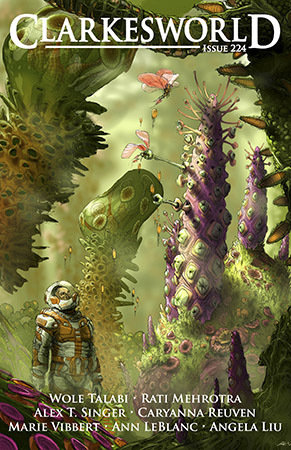 “Proxima One” by Caryanna Reuven, translated from the Spanish by Sue Burke (Clarkesworld, May 1)
“Proxima One” by Caryanna Reuven, translated from the Spanish by Sue Burke (Clarkesworld, May 1)
April 10, 2025
SFT Awards (unofficial)
*For books and stories published in 2024
*Listed in order of publication
BEST NOVEL
Blue Lard by Vladimir Sorokin, tr from the Russian by Max Lawton (NYRB Classics)
Thirst by Marina Yuszczuk, tr from the Spanish (Argentina) by Heather Cleary (Dutton)
Jumpnauts by Hao Jingfang, tr from the Chinese by Ken Liu (S&S/Saga Press)
The Book Censor’s Library by Bothayna Al-Essa, tr from the Arabic (Kuwait) by Ranya Abdelrahman and Sawad Hussain (Restless Books)
Oracle by Thomas Olde Heuvelt, tr from the Dutch by Moshe Gilula (Tor Nightfire)
Swan Knight by Fumio Takano, tr from the Japanese by Sharni Wilson (Luna Press Publishing)
Woodworm by Layla Martinez, tr from the Spanish (Spain) by Sophie Hughes and Annie McDermott (Two Lines Press)
The New Seoul Park Jelly Massacre by Cho Yeeun, tr from the Korean by Yewon Jung (Honford Star)
The Third Love by Hiromi Kawakami, tr from the Japanese by Ted Goossen (Granta Books)
Mevlido’s Dreams by Antoine Volodine, tr from the French (France) by Gina M. Stamm (University of Minnesota Press)
Pink Slime by Fernanda Trias, tr from the Spanish (Uruguay) by Heather Cleary (Scribner)
The Dallergut Dream Department Store by Miye Lee, tr from the Korean by Sady Joosun Lee (Hanover Square Press)
The Full Moon Coffee Shop by Mai Mochizuki, tr from the Japanese by Jesse Kirkwood (Ballantine)
The Night Guest by Hildur Knútsdóttir, tr from the Icelandic by Mary Robinette Kowal (Tor Nightfire)
Beggar’s Bedlam by Nabarun Bhattacharya, tr from the Bengali by Rijula Das (Seagull Books)
No Mad Land by Francesco Verso, tr from the Italian by Sally McCorry (Flame Tree Publishing)
The Proposal by Bae Myung-hoon, tr from the Korean by Stella Kim (Honford Star)
The Third Realm by Karl Ove Knausgaard, tr from the Norwegian by Martin Aitken (Penguin)
Suggested in the Stars by Yoko Tawada, tr from the Japanese by Margaret Mitsutani (New Directions)
Blood of the Old Kings by Kim Sung-il, tr from the Korean by Anton Hur (Tor Books)
Vacated Landscape by Jean Lahougue, tr from the French (France) by K. E. Gormley (Wakefield Press)
The Return of the Dwarves (Book 2) by Markus Heitz, tr from the German by Sheelagh Alabaster (Arcadia Books)
Kree by Manuela Draeger, tr from the French (France) by Lia Swope Mitchell (University of Minnesota Press)
Before We Forget Kindness by Toshikazu Kawaguchi, tr from the Japanese by Geoffrey Trousselot (Hanover Square Press)
The Last Day by Owain Owain, tr from the Welsh by Emyr Wallace Humphreys (Parthian Books)
On the Calculation of Volume (Books 1 and 2) by Solvej Balle, tr from the Danish by Barbara J. Haveland (New Directions)
The Third Temple by Yishai Sarid, tr from the Hebrew by Yardenne Greenspan (Restless Books)
The Factory by Ihor Mysiak, tr from the Ukrainian by Yevheniia Dubrova and Hanna Leliv (Atthis Arts)
BEST COLLECTION
Your Utopia by Bora Chung, tr from the Korean by Anton Hur (Algonquin Books)
You Glow in the Dark by Liliana Colanzi, tr from the Spanish (Bolivia) by Chris Andrews (New Directions)
Wafers by Ha Seong-nan, tr from the Korean by Janet Hong (Open Letter)
Under the Neomoon by Wolfgang Hilbig, tr from the German by Isabel Fargo Cole (Two Lines Press)
Festival and Game of the Worlds by César Aira, tr from the Spanish (Argentina) by Katherine Silver (New Directions)
A Sunny Place for Shady People by Mariana Enriquez, tr from the Spanish (Argentina) by Megan McDowell (Hogarth)
Waiting for the Fear by Oğuz Atay, tr from the Turkish by Ralph Hubbell (NYRB Classics)
BEST ANTHOLOGY
Through the Night Like a Snake: Latin American Horror Stories, ed. Sarah Coolidge, tr from the Spanish by various translators (Two Lines Press)
The Inhumans and Other Stories: A Selection of Bengali Science Fiction, ed. Bodhisattva Chattopadhyay, tr from the Bengali by the editor (MIT Press)
Sinophagia: A Celebration of Chinese Horror 2024, ed. Xueting C. Ni, tr from the Chinese by the editor (Solaris)
BEST (STANDALONE) SHORT STORY
“Stars Don’t Dream” by Chi Hui, tr from the Chinese by John Chu (Clarkesworld)
“A Song for Sleep” (excerpt from Your Utopia) by Bora Chung, tr from the Korean by Anton Hur (Words Without Borders)
“House on the Edge of the Crater” by Gábor Képes, tr from the Hungarian by Anna Kállai (Samovar)
“The House of the Scolopendra” by Nicola Lombardi, tr from the Italian by J. Weintraub (Samovar)
“The Peregrine Falcon Flies West” by Yang Wanqing, tr from the Chinese by Jay Zhang (Clarkesworld)
“Specimen” by Joyce Baker, tr from the French (Quebec) by E. S. Taillon (Words Without Borders)
“Chlorosis” by Ariane Gélinas, tr from the French (Quebec) by Remy Attig (Words Without Borders)
“Ruins” by Mélodie Joseph, tr from the French (Quebec) by Eli Tareq El Bechelany-Lynch (Words Without Borders)
“Welcome, Alyson” by J. D. Kurtness, tr from the French (Quebec) by Hannah Allen-Shim (Words Without Borders)
“Resurgence” by Ayavi Lake, tr from the French (Quebec) by H. Felix Chau Bradley (Words Without Borders)
“The Garden of Tomatoes” by Esther Karin Mngodo, tr from the Swahili (Tanzania) by Jay Boss Rubin (Asymptote Journal)
“One Flew Over the Songhua River” by Qi Ran, tr from the Chinese by Andy Dudak (Clarkesworld)
Excerpt from Thirst by Marina Yuszczuk, tr from Spanish (Argentina) by Heather Cleary (LitHub)
“An Eye in the Throat” by Samanta Schweblin, tr from the Spanish (Argentina) by Megan McDowell (The Paris Review)
“Stereopolis” by Gheorghe Săsărman, tr from the Romanian by Monica Cure (Sci Phi Journal)
“The Rambler” by Shen Dacheng, tr from the Chinese by Cara Healey (Clarkesworld)
“Oh, Fangèd Night!” by Hijab Imtiaz Ali, tr from the Urdu (India) by Daisy Rockwell (Samovar)
“The Little Monster” by Léopold Chauveau, tr from the French (France) by Nat Paterson (Samovar)
“Renting to Killers” by Elena Pavlova, tr from the Bulgarian by the author and Kalin M. Nenov (Asimov’s)
“The Rattler” by Leonid Kaganov, tr from the Russian by Alex Shvartsman (Asimov’s)
“Meat and Pomegranate” by Cho Yeeun, tr from the Korean by Sung Ryu (Words Without Borders)
“The Reflection of Sand” by Tan Gang, tr from the Chinese by Emily Jin (Clarkesworld)
“On My Way to Heaven” by Alberto Chimal, tr from the Spanish (Mexico) by Patrick Weill (F&SF)
“Growth Rings of the Earth” by Xinwei Kong, tr from the Chinese by the author (F&SF)
“Olympia” by Gheorghe Săsărman, tr from the Romanian by Monica Cure (Sci Phi Journal)
“They Are Among Us” by Bernardo Fernández, tr from the Spanish (Mexico) by Adan Jimenez (Sci Phi Journal)
“Death Valley” by Junko Mase, tr from the Japanese by Sharni Wilson (World Literature Today)
“The Lesser Evil” (excerpt) by C. E. Feiling, tr from the Spanish (Argentina) by Frances Riddle (World Literature Today)
“The Devil’s Offspring” by Mahmoud Fikry, tr from the Arabic (Egypt) by Emad El-Din Aysha (World Literature Today)
“You Have to Read This!” by John Ajvide Lindqvist, tr from the Swedish by Marlaine Delargy (World Literature Today)
“Bone by Bone” by Mónika Rusvai, tr from the Hungarian by Vivien Urban (Samovar)
“P-Pod” by Kaori Fujino, tr from the Japanese by The TamaGO Collective (Words Without Borders)
“The Children I Gave You, Oxalaia” by Cirilo Lemos, tr from the Portuguese (Brazil) by Thamirys Gênova (Clarkesworld)
“Záalzeck” by Gheorghe Săsărman, tr from the Romanian by Monica Cure (Sci Phi Journal)
“The Face of God: A Documentary” by Damián Neri, tr from the Spanish (Mexico) by the author (Clarkesworld)
“Because Flora Had Existed. And I Had Loved Her” by Anna Martino, tr from the Portuguese (Brazil) by Anna Martino (Samovar)
“Whale Ocean” by Nanpai Sanshu, tr from the Chinese by Xueting C. Ni (Samovar)
“Game Land” by Juhani Karola, tr from the Finnish by Lola Rogers (World Literature Today)
“The Coffee Machine” by Celia Corral-Vázquez, tr from the Spanish (Spain) by Sue Burke (Clarkesworld)
“Life Sentence” by Gelian, tr from the Chinese by Blake Stone-Banks (Clarkesworld)
“Songs of the Snow Whale” by K. A. Teryna, tr from the Russian by Alex Shvartsman (Reactor)
“Arcanum” by Gheorghe Săsărman, tr from the Romanian by Monica Cure (Sci Phi Journal)
April 1, 2025
Out This Month: April
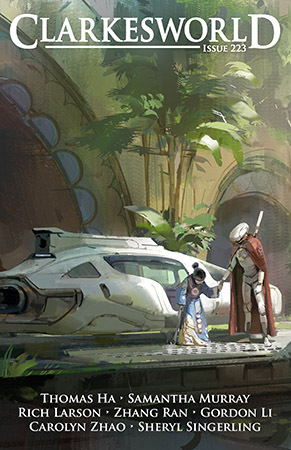
“Still Water” by Zhang Ran, translated from the Chinese by Andy Dudak (Clarkesworld, April 1)

A Carnival of Atrocities by Natalia García Freire, translated from the Spanish (Ecuador) by Victor Meadowcroft (World Editions, April 1)
Cocuán, a desolate town nestled between the hot jungle and the frigid Andes, is about to slip away from memory. This is where Mildred was born, and where everything she had—her animals, her home, her lands—was taken from her after her mother’s death. Years later, a series of strange events, disappearances, and outbursts of collective delirium will force its residents to reckon with the legend of old Mildred. Once again, they will feel the shadow of death that has hung over the town ever since she was wronged. The voices of nine characters—Mildred, Ezequiel, Agustina, Manzi, Carmen, Víctor, Baltasar, Hermosina, and Filatelio—tell us of the past and present of that doomed place and Mildred’s fate. Natalia García Freire’s vivid language blurs the lines between dreams and reality and transports the reader to the hypnotic Andean universe of Ecuador.
March 1, 2025
Out This Month: March
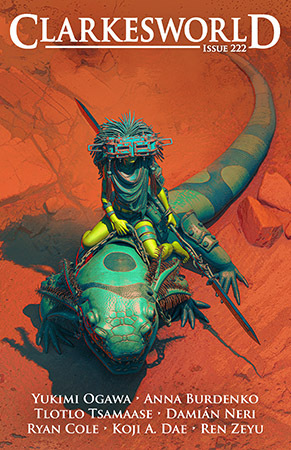 “Pollen” by Anna Burdenko, translated from the Russian by Alex Shvartsman (Clarkesworld, March 1)“The Sound of the Star” by Ren Zeyu, translated from the Chinese by Jay Zhang (Clarkesworld, March 1)
“Pollen” by Anna Burdenko, translated from the Russian by Alex Shvartsman (Clarkesworld, March 1)“The Sound of the Star” by Ren Zeyu, translated from the Chinese by Jay Zhang (Clarkesworld, March 1)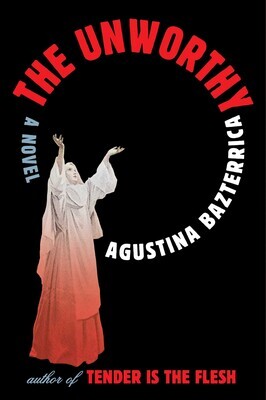
The Unworthy by Agustina Bazterrica, translated from the Spanish (Argentina) by Sarah Moses (Scribner, March 4).
The long-awaited new novel from the author of global sensation Tender Is the Flesh: a thrilling work of literary horror about a woman cloistered in a secretive, violent religious order, while outside the world has fallen into chaos
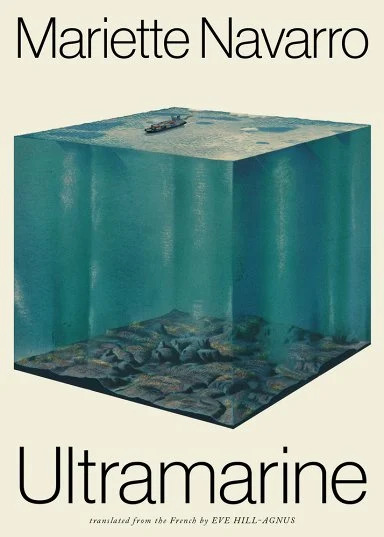
Ultramarine by Mariette Navarro, translated from the French by Eve Hill-Agnus (Deep Vellum, March 4).
Winner of the 2024 Albertine Translation Prize
The metaphysically disorienting tale of a female captain who loses control of her thinking—and her crew—aboard a cargo ship in the Atlantic.

Red Sword by Bora Chung, translated from the Korean by Anton Hur (Honford Star, May 13).
Red Sword is the mesmerizing and haunting English-language debut novel by International Booker Prize-shortlisted author Bora Chung. Expertly translated by Anton Hur, this speculative fiction unfolds on a distant, war-ravaged planet where advanced technologies wreak havoc and devastation. Told in sparse, evocative prose, a slave-turned-reluctant hero must traverse the alien terrain to uncover the truth about her identity and that of her enslaved companions. Characteristically borrowing from a plethora of genres, Red Sword blends a poignant exploration of social relations with stunning world-building, and challenges readers to consider what it means to wield power over others
February 5, 2025
Review: Egypt + 100

full title: Egypt + 100: Stories from a Century after Tahrir (Futures Past)
edited by Ahmed Naji
various translators
Comma Press, 2024
176 pages
grab a copy here or through your local independent bookstore or library
Contents:
“The Wilderness Facilities” by Mansoura Ez-Eldin, tr Paul Starkey
“Drowning” by Heba Khamis, tr. Maisa Almanasreh
“Everything is Great in Rome” by Ahmed El-Fakharany, tr. Robin Moger
“The Mistake” by Mohamed Kheir, tr. Andrew Leber
“The Sky Room” by Azza Sultan, tr. Elizabeth Jaquette
“Encounter with the White Rabbit” by Michel Hanna, tr. Mohammed Ghalayini
“The Solitude of Prince Boudi” by Ahmed Wael, tr. Raphael Cohen
“God Only Knows” by Belal Fadl, tr. Raph Cormack
“Unicorn 2512” by Nora Nagi, tr. Mayada Ibrahim
“Mama” by Camellia Hussein, tr. Basma Ghalayini
“Oral History of Past, Obsolete and Forgotten” by Yasmine El Rashidi (written in English)
“The Tanta White People Museum” by Ahmed Naji, tr. Rana Asfour
“We asked all the contributors to imagine the Egypt of January 25th 2011[,] only a hundred years later–extrapolated, as Le Guin would say, but based on a political extrapolation of that moment in time, more than a scientific one…The result is a series of visions of the future inspired by the dreams and nightmares of the present.” – editor Ahmed Naji, “Introduction” (xv-xvi)
Egypt + 100 is Comma Press’s fourth book in the “Futures Past” series, following Iraq + 100, Palestine + 100, and Kurdistan + 100, where writers are asked to imagine life a century after a major event, such as invasion or revolution. This latest book in the series offers Anglophone readers a further interesting glimpse into the world of Arabic speculative fiction coming out of Egypt. Already in English are a number of works of Egyptian Arabic SFT: Basma Abdel-Aziz’s The Queue (2012, 2016), Gamal al-Ghitani’s The Zafarani Files (1976, 2009), Mohamed Kheir’s Slipping (2021), Ahmed Naji’s Using Life by (the editor of Egypt + 100) (2017), Mohamed Rabie’s Otared (2016), Khairy Shalaby’s The Time-Travels of the Man Who Sold Pickles and Sweets (1991, 2010), and Ahmed Khaled Towfik’s Utopia (2009, 2011). Many of these texts are dystopian stories, though the Ghitani and Shalaby texts are darkly comic fantasies.
The current anthology, in which authors imagine what Egypt will be like culturally, politically, socially, and economically, in 2111 offers Anglophone readers a richly varied by also uneven text. Some stories, like “The Wilderness Facilities,” “Everything is Great in Rome,” “The Sky Room,” and “Unicorn 2512” are fully-developed, engrossing stories that show the authors’ skill and creative facility, while others seem to lack a plot or dwell on the authors’ gripes about political or social issues.
In his introduction, Naji begins with an important question: what exactly is “science fiction”? Of course, this question is asked constantly and will always be asked whenever the subject comes up. But Naji points out that, in the context of the Arab Spring, the revolution in Egypt, and the political realignments of the early 21st century, “science fiction” has become a more expansive term. Do we narrowly define it according to genre constraints, or do we think about it more broadly in terms of what the future might bring, whether or not the story includes advanced technology, alien visitation, etc.? Many of the stories in this anthology imagine an Egypt that has drifted toward authoritarianism or some sort of sterile, hyper-orderly, hyper-technological society. Floods and other natural catastrophes punctuate these texts, sometimes completely remaking the cities and towns of this near-future Egypt.
The stories I previously mentioned play with the genre of “science fiction” in creative ways. In “The Wilderness Facilities,” Mansoura Ez-Eldin imagines an Egypt in which people stay in their houses and do everything online–shopping, socializing–while those who have not submitted to the new way of the world must live in housing on the outskirts of the cities, under constant surveillance (see my discussion of “Unicorn 2512” below). When one woman in the city decides to go outside and experience the world with her own senses, she is found murdered in her bed, the image of her body projected to those living in the wilderness facilities to underscore that they must comply or face terrible consequences. We later learn that the professor who had first suggested this arrangement later regretted it, and was himself imprisoned in the facility.
“Everything is Great in Rome” opens with the startling declaration that on the morning of the 100th anniversary of the revolution, “we woke to find that Tahrir Square was no more and in its place stood the Colosseum, the most magnificent and brutal sporting arena in history” (35). Residents are told that, from now on, daily fights at the arena will be broadcast live across the country. Meanwhile, the ruler has withdrawn from sight and no one knows who is actually in charge. Eventually, the most talented fighter in the Colosseum is chosen to fight a special person, a fight that will change the direction of the country, and the absent leader is somehow involved….
Azza Sultan’s “The Sky Room” imagines an Egypt where the landscape is dotted with towers that have rooms projecting blue skies and other images to keep the population satisfied, since they are only allowed to walk the streets on certain days of the week. Everything is run by a harsh, controlling government, but the narrator recalls throughout the story the tales her father told her about what life was like before the revolution and authoritarian crackdown. Punctuating the narrator’s memories of life with her parents are glimpses of the narrator’s current world, where people have been thrown back to a pre-modern life after the towers and other buildings all collapsed.
“Unicorn 2512,” my favorite story of the group, follows the growing self-awareness of a young woman whose mother has just died in a “House of Noncompliance,” where people were forced to live who refused to join the metaverse. Unicorn has lived most of her days virtually–shopping, working, dating–while her mother, a writer, refused to join most of the rest of the world in doing the same. Disturbed by her mother’s smile of pity, Unicorn thinks through her life and realizes that it hasn’t been fulfilling and that she has grown old without realizing it. Deciding to write a story, like her mother used to, she then reads it in the middle of a square, in front of other real people, and for that her afterlife in the metaverse is deleted. Nonetheless, those who heard the first part of her story become interested in the rest, and they find her manuscript and start reading it out loud in public, surrounding her body.
Egypt + 100 is a great addition to the growing corpus of Egyptian and Arabic SFT, offering us a unique way of thinking about what life in that region might be like a century from now.
February 4, 2025
SFT @ Seattle Worldcon 2025

My series on SF in Translation of the early 1960s can be found on the Seattle Worldcon 2025 website. Posts so far include:
Fantastic Fiction: Kōbō Abe and Post-War Japanese SFT
Fantastic Fiction: Perry Rhodan
Fantastic Fiction: Nathalie Henneberg’s Forays into the Strange
Fantastic Fiction: SF in Central/Eastern Europe
February 1, 2025
Out This Month: February
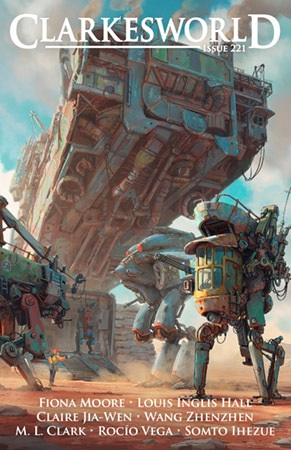 “Bodyhoppers” by Rocío Vega, translated from the Spanish by Sue Burke (Clarkesworld, February 1)“The Hanging Tower of Babel” by Wang Zhenzhen, translated from the Chinese by Carmen Yiling Yan (Clarkesworld, February 1)
“Bodyhoppers” by Rocío Vega, translated from the Spanish by Sue Burke (Clarkesworld, February 1)“The Hanging Tower of Babel” by Wang Zhenzhen, translated from the Chinese by Carmen Yiling Yan (Clarkesworld, February 1)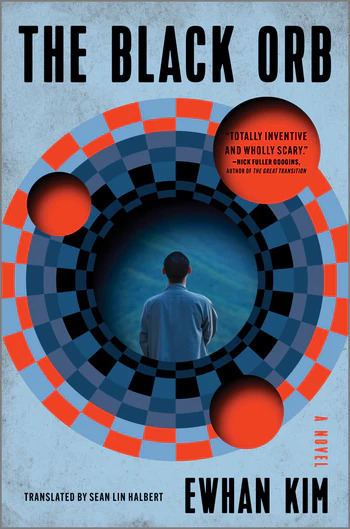
The Black Orb by Ewhan Kim, translated from the Korean by Sean Lin Halbert (MIRA, February 4).
The object was a black orb, roughly two meters in diameter. Despite its large size, it made no sound as it moved. Although it wasn’t chasing Jeong-su fast enough to catch him, it was unrelenting and persistent in its pursuit…One evening in downtown Seoul, Jeong-su is smoking a cigarette outside when he sees something impossible: a huge black orb appears out of nowhere and sucks his neighbor inside. Jeong-su manages to get away, but the terrifying sphere can move through walls, so he’s sure he won’t be able to hide for long. The orb soon begins consuming every person caught in its path, and no one knows how to stop it. Impervious to bullets and tanks, the orb splits and multiplies, chasing the hapless residents of Seoul out into the country and sparking a global crisis with widespread violence and looting. Jeong-su must rely on his wits as he makes the arduous journey in search of his elderly parents. But the strangest phases of this ever-expanding disaster are yet to come and Jeong-su will be forced to question everything he has taken for granted.
January 1, 2025
Out This Month: January
 Strange Pictures by Uketsu, translated from the Japanese by Jim Rion (HarperVia, January 14).
Strange Pictures by Uketsu, translated from the Japanese by Jim Rion (HarperVia, January 14).The spine-tingling “triumphant international debut” (Publishers Weekly starred review) that has taken Japan by storm—an eerie fresh take on mystery-horror in which a series of seemingly innocent pictures draws you into a disturbing web of unsolved mysteries and shattered psyches.
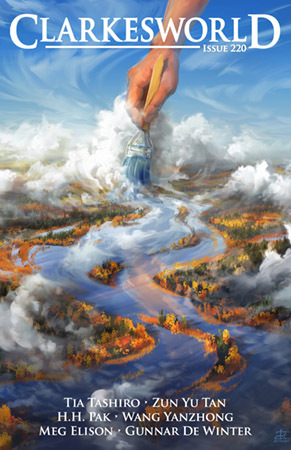 “Beyond Everything” by Wang Yanzhong, translated from the Chinese by Stella Jiayue Zhu (Clarkesworld, January 1).
“Beyond Everything” by Wang Yanzhong, translated from the Chinese by Stella Jiayue Zhu (Clarkesworld, January 1).



